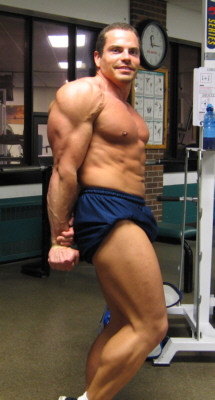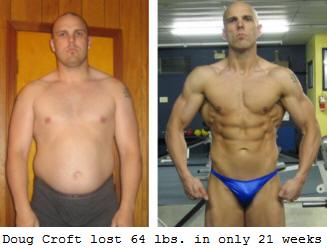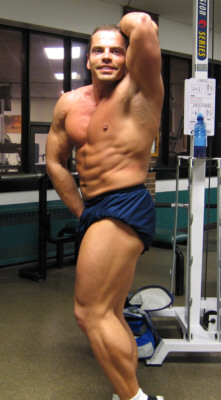Basic Bodybuilding Nutrition Program – Part 1
Click Here for part 2 of the Basic Bodybuilding Nutrition Program.

|
Your diet is without a doubt one of the most critical aspects of your total fitness bodybuilding routine. You can be consistent with your workouts, but if you don’t fuel your body properly you will NOT get the results you want. Period!
Most fitness enthusiasts are meticulous with their training and are ever so careful when scheduling their workouts, doing a precise number of exercises, sets, and reps for each muscle group, etc. But more often then not they get slack when it comes to nutrition. Do you think that you can reach your peak performance by eating only 2-3 meals per day?
The biggest excuse that people have is “I don’t have time to eat right”. But the real reason is simply laziness and lack of planning, because when done properly it doesn’t take anymore time to follow a healthy muscle building / fat burning nutrition plan then it does to eat a “see food” diet (i.e. eating whatever comes in front of your face).
|
In the first part of this article I’m going to outline the fundamentals of a very sound bodybuilding nutrition program. And then in the second part of this article I’m also going to give you some cooking and meal planning tips that will help you fit the program into your busy schedule.
Protein
Protein is the key component for providing your body with adequate amino acids to aid in building and repairing muscle tissue. Protein is the most important nutrient for bodybuilders. You should be consuming between 1 and 1.5 grams of protein per pound of bodyweight each day evenly spaced out over 5-6 meals. So for example, a 200 lb. man should eat between 200-300 grams of protein per day. Eating approx. 40-50 grams of protein per meal. Good protein sources include: lean cuts of beef, lean cuts of pork, chicken breast, turkey breast, fish, eggs, cottage cheese, and protein supplements.
You may be wondering about the range of 1 to 1.5 grams of protein per pound of bodyweight per day and which end of the range you should aim for. Well this is the way I look at it, if you are the type of person who is really serious about your training and you want to make progress as fast as possible then stick to the upper end of the range and eat 1.5 grams of protein per pound of bodyweight daily. On the other hand, if you are just working out to “keep in shape” and are not overly concerned about gaining as much muscle as fast as possible can then you can stick to the lower end and just eat 1 gram of protein per pound of bodyweight daily.
Another thing, if you are concerned that too much protein is “bad for you”, you needn’t be. It is not uncommon for young bodybuilders to be led astray by a well meaning doctor or dietitian saying that too much protein can cause kidney damage. But this is just a myth and outdated information, there has never been any study that shows a high protein intake causes any type of kidney damage in healthy individuals.
Carbohydrates
Carbohydrates provide a “protein-sparing” effect. When your carbohydrate intake is too low your body will convert protein into glucose for energy. This process is called “glyconeogenesis”. Eating adequate carbohydrates is important because if your body doesn’t have enough, it has to metabolize more protein and this depletes the muscles.
Eating too few carbohydrates will also leave your muscles looking and feeling flat. Muscle fullness largely depends on the glycogen stores within the muscle cells. Your muscle glycogen stores also greatly impact your strength and energy levels in the gym and whether or not you get a “pump” while working out. If you have ever followed a low carbohydrate diet for any length of time I’m sure you have also noticed a significant loss of strength in the gym during your workouts and your muscles feel flat as a pancake making it almost impossible to get any decent pump while working out.
Your carbohydrate intake will vary depending on your training goals. If your goal is to get bigger and gain muscular size then you’ll need to eat upwards of 3 grams of carbohydrates per pound of bodyweight per day and maybe more depending on your individual metabolism. If your goal is to lose bodyfat and get leaner then you’ll need to eat around 1 – 1.5 grams of carbohydrates per pound of bodyweight daily. Good sources of carbohydrates include: oatmeal, cream of wheat, oat bran, brown rice, potatoes, yams, whole wheat pasta, whole wheat bread, all kinds of fruits and vegetables.
Just like with protein, your carbohydrate intake should be spaced out over the course of 5-6 meals per day. But you can be a little more generous with the portion sizes with your breakfast and with your post workout meals. At these times your glycogen levels are lower and need extra carbohydrates to help re-fill them.
Fat
Fat is a very important part of a healthy bodybuilding nutrition program. Your body needs fat to function properly. Besides being an energy source, fat is a nutrient used in the production of cell membranes, as well as in several hormone-like compounds called eicosanoids. These compounds help regulate blood pressure, heart rate, blood vessel constriction, blood clotting and the nervous system. In addition, dietary fat carries fat-soluble vitamins — vitamins A, D, E and K — from your food into your body. Fat also helps maintain healthy hair and skin, protects vital organs, keeps your body insulated, and provides a sense of fullness after meals.
There are 3 types of fat – saturated, monounsaturated, and polyunsaturated. You need to eat all 3 in the right balance in order to maximize your muscle growth, fat loss, and overall health.
You will get adequate saturated fat intake from your protein foods. Animal products such as beef, chicken, eggs, etc. all contain saturated fat.
Monounsaturated fat comes from foods such as seeds, nuts, olives, avocados, as well as various types of oils such as peanut oil, flaxseed oil, sesame oil, corn oil, canola oil, and olive oil.
Polyunsaturated fats are found in sea food like herring, salmon, mackerel, halibut, and fish oils.
By getting your protein intake requirements with animal products such as beef, chicken, fish, eggs, etc. and including nuts, seeds, olives, in your diet, as well as cooking with healthy oils such as olive oil you’ll meet the majority of your dietary fat needs.
It would be a good idea to also supplement your diet with fish oil capsules. Simply take a couple capsules with each meal. Fish oil is high in omega 3 fatty acids and it is also high in EPA and DHA fatty acids. These fatty acids are antioxidants and help with muscle growth and fat loss. They also have health benefits with anti-cancer and anti-inflammatory effects. Studies have shown that taking 10 grams of fish oil per day can increase your metabolic rate by as much as 400 calories per day!
Water
A little know fact about water is that the less you drink, the more likely you will become overtrained with your workouts. Muscle is comprised of over 70% water. Sweating from hard workouts causes you to lose body water. Eating a high protein diet increases your body’s need for water. And water is needed as a transport mechanism for various nutrients, vitamins, and minerals. If your water intake is too low, your ability to transport nutrients to your muscles becomes compromised, you’ll lose muscle fullness, and toxins will build up in the body.
To stay adequately hydrated you should drink 0.6 ounces of water per pound of bodyweight daily. To put this in perspective a 200 lb. man should drink 120 ounces of water over the course of the day. That’s about 15 glasses of water daily. While this may seem like a lot, it is not that hard to consume this much water. Simply having a glass or two with each meal would equal about 10 glasses. And then sipping water from a water bottle during the day and during your workouts can easily make up for the other 5 glasses. As I write this article I have a water bottle on my desk that I’ve been sipping from all morning. When I'm at the gym I always keep a water bottle with me at all times so I can take sips in between sets to keep myself hydrated.
(Note: this is an average water intake, if you live in a particularly hot climate or have a physically demanding job where you are working hard for long hours then you may need to drink even more water.)
If you enjoyed this article, be sure to check out my Total
Fitness Bodybuilding DVD Training System. This comprehensive DVD series has
over 3 hours of instructional weight training information.
In addition to the DVD’s there is a bonus CD-ROM that
contains hundreds of training and nutritional tips and strategies for building
lean muscle and burning bodyfat. You’ll also get a copy of my Bodybuilding
Contest Diet Log – I’ve kept a detailed nutritional log every day for 4
months during my pre-contest diet for the 2006 bodybuilding season. You’ll see
exactly what I ate every single day to get in my most ripped contest
condition ever!
Check it out for yourself now at: www.LeeHayward.com/dvd

I recently competed in my first bodybuilding competition. I started my contest diet at 242 lbs. and with the help of Lee's program I lost 64 lbs. and got into the best shape of my life. I didn't make the middleweight class like I had hoped, but even as the lightest competitor (178 lbs.) in the light-heavyweight class I still managed to place 3rd.
I would like to thank Lee for all the help that he gave me during my contest prep. His knowledge and experience really helped ease off the pressure of being a first time competitor. I feel really proud of what I've accomplished and it is amazing how far I have come from where I started.
Again, thanks Lee for your help with everything, it was greatly appreciated and you helped make the whole experience a great one.
Cheers
Doug Croft
Canada
|
Total Fitness Bodybuilding DVD Training System
Lee Hayward's Total Fitness Bodybuilding 3 Disc DVD Training System is jam-packed with the most powerful techniques for pushing your overall muscular development to a whole new level.

Click Here To Order Your Copy Today
- Take your workouts to a higher-level and accelerate your progress in the gym with 25 unique workout programs for all levels from beginners to advanced.
- Achieve total ripped muscularity while maintaining mass with a complete day by day 16 week physique transformation fat loss diet plan.
- Find out once and for all the ideal number of sets & reps to do for each exercise you perform. As well as a simple formula for determining exactly how much weight to lift for each and every exercise.
- No Matter What Your Fitness Goals Are, You Can Start Using This Powerful Muscle Building System RIGHT NOW To Become Leaner, Stronger, & More Muscular Than You've Ever Been Before!
|

|
Click Here For More Information And To Download A FREE Sample Video Clip...
| 
